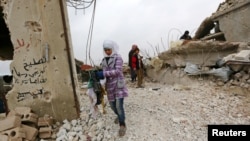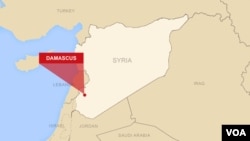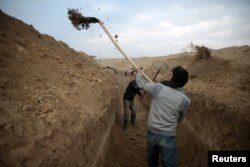The cease-fire in Syria appears fragile as government forces escalated their attacks near the capital of Damascus and a coalition of rebel groups said they would suspend their participation in preliminary peace talks set for later this month.
The negotiations are scheduled to be in the capital of Kazakhstan but the rebels said they are withdrawing due to what they said is the Syrian government's violation of the cease-fire agreement, which was reached on December 30.
"As these violations are continuing, the rebel factions announce ... the freezing of all discussion linked to the Astana negotiations," the rebels said Monday in a joint statement.
The Syrian Observatory for Human Rights said the Syrian army, supported by air strikes and artillery fire, advanced Monday in an attempt to capture the water-rich areas around the village of Wadi Barada and Barada Valley, located northwest of Damascus.
Rami Abdel, a spokesman for the human rights monitoring group, said Syrian troops and allied forces were engaged in intense battles with the opposition, including al-Sham Front, a former affiliate of Al-Qaida. Rebel fighters, however, deny the militant group is in the area.
At stake is water. The government has said rebels have damaged key water infrastructure, causing water supplies to be cut. The U.N. says at least 4 million people in Damascus have been without water since December 22 and about 1,000 women and children fled the area last weekend.
The peace talks are being organized by Russia, Iran and Turkey, which also played key roles in negotiating the current cease-fire. The countries have yet to comment on the rebels decision to suspend preliminary talks.
The cease-fire excludes extremist targets in the war-ravaged country, including rebel-held territory on the outskirts of Damascus. But the cease-fire has managed to remain in effect, despite the ongoing violence.
An airstrike Sunday near the Turkish border killed at least three extremist leaders. The observatory said eight people were killed in the attack in northern Idlib province, on a road leading from the town of Sarmada toward the border.
It was not immediately clear who launched the attack, but an observatory report said it was most likely carried out by the U.S.-led coalition battling Islamic State extremists in the region.
U.S.-led coalition warplanes and drones have killed some of the region's most senior jihadist commanders, since Islamic State extremists declared a caliphate in northern Syria in 2014, after pushing through northern Syria and large swaths of Iraq.
The observatory said the dead in Sunday's strike included al-Qaida commander Khattab al-Qahtani and Abu Omar Turkistani, whose Islamist Uighur force joined with Syrian extremists in a push to topple the government of President Bashar al-Assad.
On Monday, Turkey's military said its warplanes killed at least 22 militants near its border with northern Syria, and said Russian aircraft destroyed IS targets near the extremist controlled northern town of al-Bab.
Turkey launched its so-called "Euphrates Shield" offensive on August 24, just hours after an Islamic State (IS) terror strike on a wedding party in the southern Turkish city of Gaziantep killed more than 50 people and wounded scores of others. The operation's stated goal is to clear the Syria-Turkey frontier of IS fighters and Kurdish forces by backing the so-called Free Syrian Army with warplanes and artillery.







